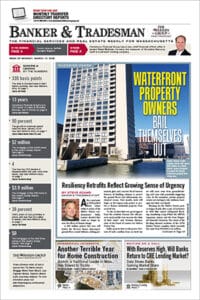The top banking and real estate groups in Massachusetts have teamed up with a pair of business groups to plead with state senators to pass on proposed new real estate transfer taxes.
The Greater Boston Chamber of Commerce, Greater Boston Real Estate Board, Home Builders and Remodelers Association of Massachusetts, Massachusetts Association of Realtors, Massachusetts Bankers Association, Massachusetts Land Title Association, Massachusetts Mortgage Bankers Association, NAIOP Massachusetts and the North Central Massachusetts Chamber of Commerce published an open letter to members of the state Senate Thursday arguing that a new sales tax on real estate sales “in any form will not support” attempts to increase either the state’s housing supply or the affordability of its homes.
Gov. Maura Healey had proposed a local-option transfer tax in her huge housing finance and policy bill in the fall. House of Representatives leaders stripped that provision out of the version of the bill they passed earlier this month, but the Senate is expected to take up the bill next week and Senate President Karen Spilka has declined to share her position on the issue.
Supporters say letting towns and cities apply a tax of between 0.5 percent and 2 percent to real estate sales above $1 million will make those who’ve benefited the most from the state’s tight housing market and valuable commercial real estate sector contribute to dedicated local affordable housing trust funds. The idea has particularly strong support among city of Boston politicians and many leaders on Cape Cod and Islands, where high housing costs and tight supply mean many workers – even first responders and other municipal employees – can’t find local housing during the summer vacation season, or must commute from off-Cape. Some local real estate industry figures in the region are among the leaders pushing the idea.
Opponents say local transfer taxes would add extra, unwelcome costs to new housing developments. They also cite 2014 research by two Columbia University professors that found such taxes drive up home prices in hot markets, and claim the taxes would further depress commercial property values in Boston’s troubled downtown office market..
“Municipalities do not need new revenue sources to increase housing affordability. Instead, they need to utilize available revenue streams and permit more development to serve all income levels,” Thursday’s letter reads.
Instead, the business groups say towns and cities that want to raise more money for affordable housing should increase the amount of Community Preservation Act property tax surcharges, citing research done by the Tufts University Center for State Policy Analysis, commissioned by the Greater Boston Real Estate Board, that showed many towns are not maximizing their CPA revenue and that many aren’t using the money they do collect for housing projects.






